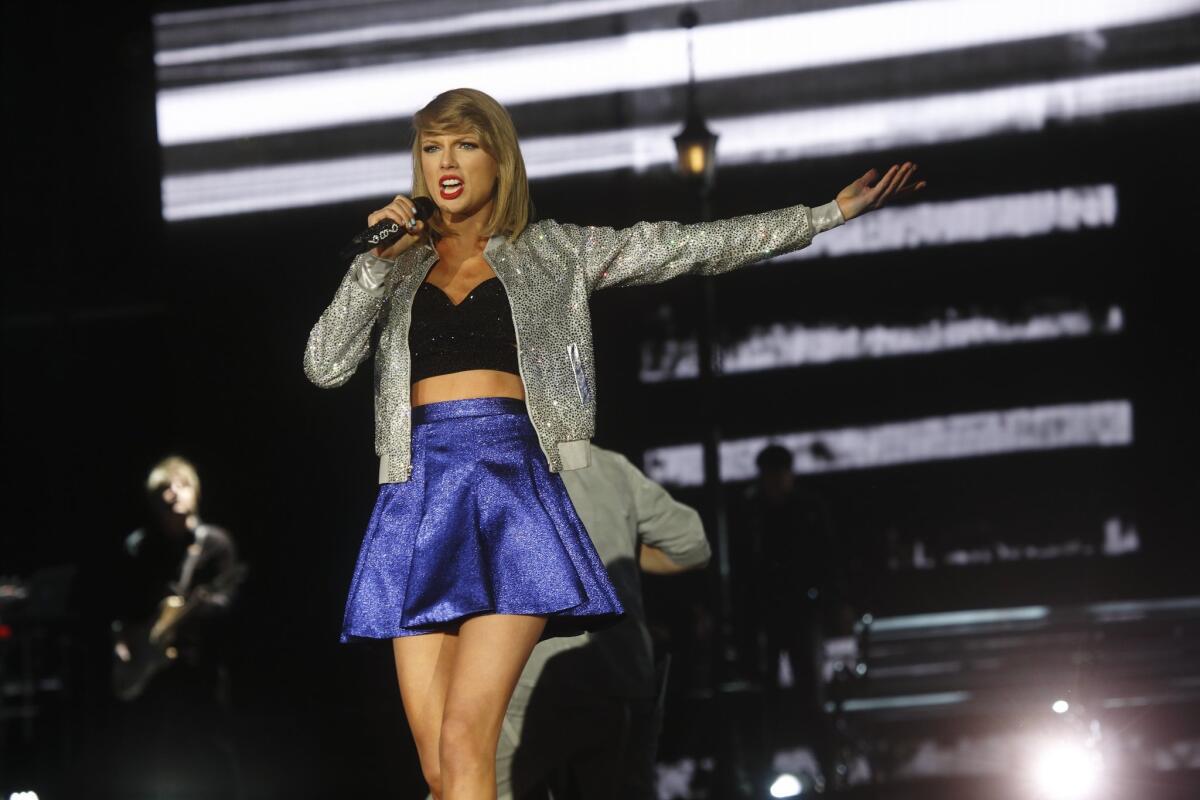Opinion: Taylor Swift turns Apple around, but what about radio?

Taylor Swift performs at Rock in Rio USA at the MGM Resorts Festival Grounds in Las Vegas in May.
When chart-topper Taylor Swift called out Apple’s new streaming service for planning to pay no royalties to recording artists while users were enjoying a three-month free trial, the Interwebs practically shook from all the heads nodding.
So, when is Swift going to call out radio for doing the same thing, day in and day out?
Please note, this is no criticism of Swift’s stance on Apple Music. In case you’re still working off your Father’s Day hangover, Swift issued an open letter via Tumblr on Sunday telling the company that Apple Music was never, ever getting her latest LP, “1989,” because it wasn’t going to pay artists any royalties during the service’s three-month free trial period. Less than 24 hours later, a top Apple executive announced on Twitter that the company would, in fact, pay royalties.
Swift insisted that she wasn’t speaking out for her own highly compensated self, but on behalf of every recording artist, songwriter and producer. Regardless of whose cause she was championing, though, she was right. It’s outrageous that a $672-billion company expected musicians to subsidize its customer-acquisition costs.
And it’s equally outrageous that the major labels, which control the copyrights to much of popular music, apparently agreed to this demand. Apple isn’t some fledgling company taking a chance on a radically different form of music consumption. It’s the world’s best-capitalized corporation following a trail blazed by others, and it has long used music services as slim- or no-profit ventures to support its high-margin hardware.
Yet with rare exceptions, over-the-air radio stations do not pay recording artists for the songs they play, and they never have. They pay a small percentage of their revenue to songwriters, but nothing to the people who turn sheet music into sound.
The main reason they don’t pay is because they’re not compelled to by federal copyright law, which does not grant recording artists a copyright over the public performance of their works unless it’s done digitally -- for example, via satellite radio or a webcast. Lawmakers have tried several times to enact such a right, only to be blocked by broadcasters who argue that it would drive music-oriented stations out of business.
The radio industry also insists that the promotional value of radio airplay is compensation enough. There’s no question that getting into heavy rotation can help a band sell tickets to a concert, but that doesn’t explain why every station in the country should get a free pass on all artists, regardless of whether they’re going to be performing anywhere nearby. It’s a bit like saying that televising basketball makes the sport more popular, so the networks shouldn’t have to pay anything for the right to carry the games.
Although the fight over broadcast royalties has been going on for decades, it has grown in importance with the emergence of online music services such as Pandora. Webcasters all have a legal obligation to pay royalties for their radio-like services, but their over-the-air competitors do not. Simple fairness demands that similar products be subject to similar rules.
As noted above, some artists do get paid by some over-the-air stations because their labels negotiated for them. Taylor Swift, in fact, is one of those artists. Her record company, Big Machine Music, has struck deals with Clear Channel (now iHeartMedia) and a handful of smaller chains.
Such deals have been the exception, however. That’s why the labels and musicians’ unions continue to push for legislation, such as the Fair Pay Fair Play Act, to eliminate over-the-air stations’ free ride.
One reason Swift could get Apple to turn on a dime, aside from the sheer rightness of the cause, was the fact that the company can’t include songs in its on-demand service without the copyright holder’s permission. Artists wield no such power over radio stations, which qualify for blanket licenses to all of recorded music. So even if Swift wanted to fight the radio-royalties fight on behalf of the new artists and producers she championed Sunday, she’d be doing so with both hands tied behind her back.
Perhaps members of Congress will notice what Apple did over the weekend and ask why the same shouldn’t apply to over-the-air broadcasters.
Follow Jon Healey’s intermittent Twitter feed: @jcahealey
More to Read
A cure for the common opinion
Get thought-provoking perspectives with our weekly newsletter.
You may occasionally receive promotional content from the Los Angeles Times.











